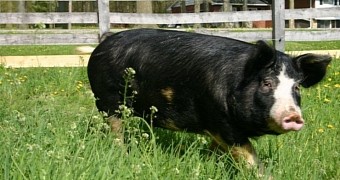Chances are there are plenty of people in this world who think that the best possible job in the world is one where all you have to do all day is eat, go for a walk, and then eat some more.
Oddly enough, it looks like such career opportunities are not confined to the realm of the fictitious. On the contrary, such jobs really do exist. The only problem is that, to land one, one must be a pig. Literally.
Not to beat about the bush, word has it that, not too long ago, the Royal Society for the Protection of Birds employed a bunch of pigs whose sole job is to help restore the Arne nature reserve in the county of Dorset.
According to Click Green, folks at the Royal Society for the Protection of Birds enlisted the help of these pigs in an attempt to restore said nature reserve without the need to employ heavy machinery that might do more harm than good.
So, what exactly are these pigs doing?
Once released in the Arne nature reserve, the six Mangalitsa pigs now working for the Society got busy exploring the area and feeding on bracken and pine needles covering the ground.
These miniature bulldozers, as Society members and supporters like to call them, will soon be joined by six Berkshire pigs. Together, the animals are expected to clean the forest floor and thus restore the natural habitat of several species.
“This is the first time that the RSPB has used pigs to graze on one of its reserves. It is an experimental project that we hope will produce fantastic results for nature at our Arne reserve,” explains Mark Singleton, Dorset reserves operations manager.
Furthermore, “Usually we would hire diggers and other machines to remove all of the pine needles from the site but that would have negative impact on the environment. We are hoping these pigs are able to do the same job in a much more environmentally friendly way, and are much more fun.”
The Dartford warbler, the stonechat, the smooth snake, the nightjar, and the sand lizard are just some of the species the Royal Society for the Protection of Birds expects will return to this nature reserve once the pigs are done cleaning the area.
Why bother to restore nature reserves?
Late last month, environmental group the World Wildlife Fund released a report saying that, between the years 1970 and 2010, the world lost over 50% of its wildlife population. Otherwise put, biodiversity dropped by a considerable extent. What's more, research indicates that things will soon go from bad to worse.
The World Wildlife Fund report says that, unlike wildlife in low- and middle-income regions, the one in high-income countries didn't do all that bad during the documented 4 decades. However, it appears that biodiversity in the UK is very much in trouble. Hence the Society's efforts to restore natural ecosystems.
“Last year’s State of Nature report highlighted that nature in the UK is in trouble, 60% of species have declined in the past 50 years,” Mark Singleton says. “This project is one of many that the RSPB is carrying out to tackle this problem and try to reverse these declines,” he adds.

 14 DAY TRIAL //
14 DAY TRIAL //